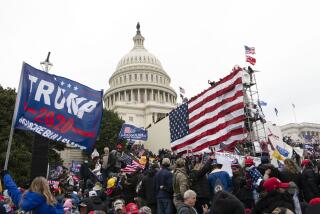Health Leaders Urge Against Immunity for Tobacco Firms
- Share via
Several prominent public health advocates said Thursday that the tobacco industry should not be given immunity from future lawsuits as a condition of a global settlement of tobacco litigation.
Among those speaking out against such a plan were David Kessler, former head of the Food and Drug Administration; C. Everett Koop, former U.S. surgeon general of the U.S.; Rep. Henry Waxman (D-L.A.); and Linda Crawford, a ranking official of the American Cancer Society.
“If [the tobacco companies] are insisting on blanket immunity, it will sink this proposal,” said Kessler, who will become dean of the Yale Medical School in July. “One cannot underestimate the importance of the tobacco companies coming to the table and assenting to FDA jurisdiction; but they want to do it with a catch, and a very big catch,” Kessler said.
“I can’t see that the tobacco companies should be rewarded for decades of deception by giving them immunity from future lawsuits,” said Waxman, a longtime tobacco industry foe. Koop and Crawford, vice president of governmental affairs for the Cancer Society, also said they thought blanket immunity was unacceptable.
Their comments came in the wake of the revelations Wednesday that the nation’s top two tobacco companies--Philip Morris and R.J. Reynolds--were in secret talks aimed at settling the huge volume of litigation against the tobacco industry. Under discussion is a proposal to give the industry legal immunity in exchange for payments into a victims’ compensation fund.
While not taking a stand on the immunity issue, Harvard Law School professor Laurence Tribe, one of the nation’s leading constitutional scholars, said that if Congress were to decided to grant the companies immunity, such a statute could survive a constitutional challenge.
“It’s clear that Congress has the power to extinguish civil liability across the board for whole categories of acts--past, present and future--as long as it replaces that liability with a reasonable quid pro quo,” Tribe said.
Such a quid pro quo could be provided by giving individuals with smoking injuries access to a fund such as the one Congress created to compensate coal miners with black lung disease, Tribe said.
Nonetheless, he acknowledged that “there are serious political questions over how large the fund” will be. Individuals close to the settlement negotiations in recent weeks have said that tobacco industry representatives have discussed providing in the range of $250 billion to $300 billion over the next 25 years. It is unclear how much of that sum would go to compensate individuals with smoking-related health problems.
Some sources said that settlement negotiations might resume in Chicago Sunday. But others said it was possible that there would only be a meeting among a group of the 22 attorneys general who have filed massive suits against the industry seeking to recover huge damages for expenses states incurred in treating smokers who had become ill.
As a result of the disclosure that negotiations had been taking place, there is now active discussion about whether other individuals, including more representatives from the public health community and perhaps even members of Congress, should join the talks.
“It’s essential to have voices from additional communities involved in the process,” said Matthew Myers, vice president of the National Center for Tobacco Free Kids, who has attended the negotiations.
But he added: “It’s harder to have frank discussions at the initial level with too large a group. You have to remember these are discussions between people who historically haven’t liked each other, don’t trust each other, seek a hidden agenda behind everything the other side says and see the whole world in a different light. It’s very hard to bridge that gap in a small group. It may be impossible in a larger group. That’s a very hard balance to strike.”
The cigarette industry has hired two prominent Washington law firms to help lobby Congress if a settlement is reached. Former Democratic Sen. George Mitchell of Maine is a partner in one of those firms and attended a negotiating session, but did not play a major role in the meeting.
However, sources said that prominent New York attorney Robert Fiske, who is the former Whitewater special counsel and is now advising Philip Morris about potential criminal liability the company might face as a result of four federal grand jury probes, attended every session and played an active role.
While attention has focused on the possibility of a global settlement in the past few days, anti-tobacco forces have won some other significant courtroom battles.
On Wednesday, a New Orleans judge certified a statewide class-action suit against the tobacco industry filed by smokers and their survivors. This marks the first certification of such a suit since a federal appeals court decertified a nationwide class action against the industry last year, saying it was too unwieldy. Similar suits have been field in a dozen states and more are expected, plaintiffs’ attorneys say.
And on Tuesday, a Pascagoula, Miss., judge ruled that industry lawyers could not use several key defenses they wanted to use in defending their clients against the suit filed by Mississippi Atty. Gen. Mike Moore. The judge granted the state’s motion to prevent the industry from claiming it is entitled to claim that premature deaths smoking saved the money it otherwise would have to spent on care for the elderly.
More to Read
Sign up for Essential California
The most important California stories and recommendations in your inbox every morning.
You may occasionally receive promotional content from the Los Angeles Times.













